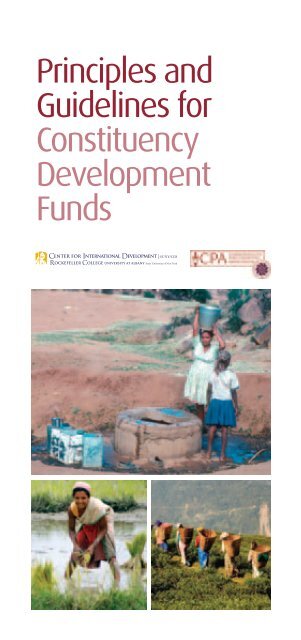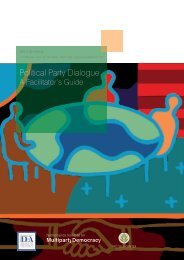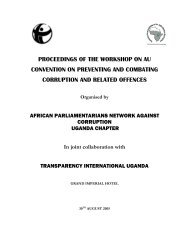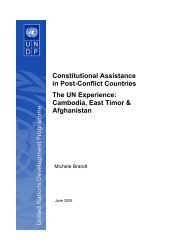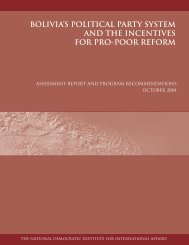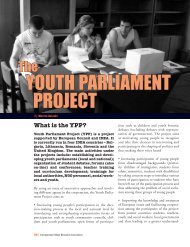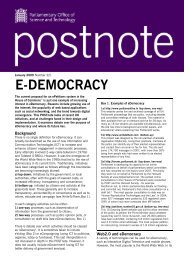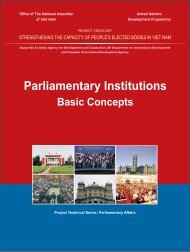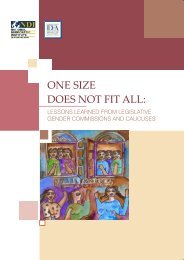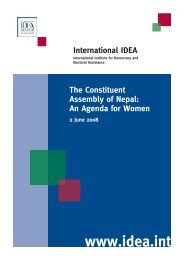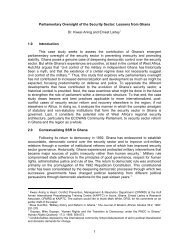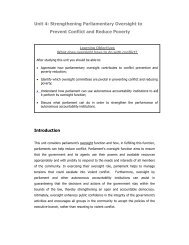Principles and Guidelines for Constituency Development Funds
Principles and Guidelines for Constituency Development Funds
Principles and Guidelines for Constituency Development Funds
Create successful ePaper yourself
Turn your PDF publications into a flip-book with our unique Google optimized e-Paper software.
IntroductionParliamentary involvement in grassroots communitydevelopment has grown considerably across Commonwealthcountries. One important tool in this ef<strong>for</strong>t has been the<strong>Constituency</strong> <strong>Development</strong> Fund (CDF), which appropriatesnational funding <strong>for</strong> MP-influenced, locally determined,constituency-level development. CDFs become legitimatemechanisms of development through their creation inlegislation. They also facilitate the legitimate connectionbetween Members of Parliament <strong>and</strong> their constituencies. Acentral hope behind CDFs is that local input promotes bettertargeting of projects to the needs of constituents, moreattention to implementation <strong>and</strong> a way of holding governmentofficials responsible <strong>for</strong> results by giving the capacity <strong>for</strong>development to MPs whose electoral fate will be locallydetermined.CPA Members recognize that CDFs should include steps toeliminate opportunities <strong>for</strong> corruption <strong>and</strong> be part ofcomprehensive development ef<strong>for</strong>ts. Below are principles <strong>and</strong>guidelines <strong>for</strong> the operation of CDFs that are consistent withinternational norms <strong>and</strong> values about legislative per<strong>for</strong>mance<strong>and</strong> socio-economic development. These principles highlightthe importance of transparent project selection <strong>and</strong>implementation in a manner that enables citizens to worktogether <strong>for</strong> the development of their constituency, dem<strong>and</strong>accountability <strong>and</strong> maintain regular oversight. Further, the2<strong>Principles</strong> <strong>and</strong> <strong>Guidelines</strong> <strong>for</strong> CDFs
administration <strong>and</strong> management of CDFs can empowerprovincial <strong>and</strong> district governments <strong>and</strong> professional experts toapply their own contextual knowledge to solve localdevelopment problems. CDFs also should foster public learningthrough monitoring <strong>and</strong> evaluation about what types ofdevelopment projects are most successful in meeting the needsof citizens <strong>and</strong> promoting community development.It is clear that the successful operation of any CDF is contingentupon strong MP involvement <strong>and</strong> leadership. As representativesof a constituency’s citizens, MPs play an essential role infacilitating citizen participation to make claims upongovernment services. In this role, MPs can ensure that CDFresources are used efficiently <strong>and</strong> honestly, with the intent tomeet the public interests of their constituencies. Thus, thepotential offered by CDFs hinges on the initiative of MPs <strong>and</strong>their dedication to empowering citizens to participate in theirown development.<strong>Principles</strong> <strong>and</strong> <strong>Guidelines</strong> <strong>for</strong> CDFsThe following are general principles of good governance thatshould apply to all CDFs across cases.I. ResponsivenessCDFs are a distributive policy tool designed to meet thedevelopment needs of citizens. Their success is contingent uponan inclusive process of consultation which fosters co-operationamong constituents, MPs, <strong>and</strong> technocratic experts. CDFinitiatives should respond to local developmental needs. On thisbasis, CDFs require channels of input <strong>for</strong> local citizens <strong>and</strong> civilsociety at all steps in decision-making on CDFs.• CDFs shall improve the well-being <strong>and</strong> livelihoods ofconstituents. The primary purpose of a CDF is to redirectadditional resources to constituencies to solvesocio-economic <strong>and</strong> humanitarian problems identified by<strong>Principles</strong> <strong>and</strong> <strong>Guidelines</strong> <strong>for</strong> CDFs 3
• All deliberative decisions made by MPs, CDF committees<strong>and</strong>/or implementers <strong>and</strong> other bodies shall be open to thepublic. The flows of all CDF funds shall be transparent <strong>and</strong>traceable to specific decision-making processes.• All financial in<strong>for</strong>mation regarding the use of CDF funds onprojects shall be publicly available <strong>and</strong> documentedaccording to st<strong>and</strong>ard <strong>and</strong> auditable accounting principles.Documentation of CDF funding shall be made publiclyavailable in a timely manner.• CDF programmes shall ensure ease of access <strong>for</strong> all citizens,who shall be allowed tomake claims of redress<strong>and</strong> appeal regardingthe CDF processaccording to governmentregulations.III. Administration <strong>and</strong>ManagementCDFs shall beadministered <strong>and</strong>managed in an efficient, effective <strong>and</strong> transparent manner. Inthis regard, MPs <strong>and</strong> committees <strong>and</strong>/or implementers shallfacilitate the process by mobilizing citizen participation,streamlining implementing mechanisms <strong>and</strong> proactivelycomplying with them. Such actions ensure that CDFadministration <strong>and</strong> management will be per<strong>for</strong>med in a timelyfashion <strong>and</strong> remain faithful to the intent of CDFs.• CDF funds shall be allocated to individual constituencies in afair <strong>and</strong> equitable manner, regardless of MPs’ partisanship,gender, religion, race or ethnicity.• CDF funds shall be released in a timely manner <strong>and</strong> CDFprojects shall be completed in a timely manner. The release<strong>Principles</strong> <strong>and</strong> <strong>Guidelines</strong> <strong>for</strong> CDFs 5
of funds shall not be employed as part of a legislativeelection campaign.• CDF funds shall be channeled to a separate account of apublic agency. Access to the funds shall be limited toofficially authorized administrators. <strong>Funds</strong> shall be managedaccording to the best practices of public financialmanagement.• The structure of CDF administration shall be clearly defined.Each administering body at corresponding levels shallfunction with unambiguous legitimate authority, explicitresponsibility <strong>and</strong> substantive commitments. The structureof authority will be clearly stated to the public to ensure thatcitizens are knowledgeable about the decision-makingprocess of CDF management.• A set of policies <strong>and</strong> procedures shall be made public toguide the implementation of the fund <strong>and</strong> the projects.• Funding shall be devoted to development in constituencies.Funded areas may include poverty reduction, infrastructure,water, education, health care, sanitation <strong>and</strong> disastermitigation, <strong>and</strong> shall address specific needs of individualconstituencies.• CDFs shall utilize all available technical expertise relevant toa particular project. Governments should make available to6<strong>Principles</strong> <strong>and</strong> <strong>Guidelines</strong> <strong>for</strong> CDFs
CDF implementing agencies relevant technical expertise.For example, public health professionals should beconsulted about any CDF project that seeks to improve thehealth care of constituents. Such expertise is essential toensure that development projects are carried out ineffective <strong>and</strong> efficient ways that improve livelihoods.• CDF committees <strong>and</strong>/or implementers shall coordinate theirprojects with similar initiatives of local governments <strong>and</strong>agencies of the central government in order to avoid waste,utilize resources efficiently, <strong>and</strong> strive <strong>for</strong> sustainability oflocal development.IV. Accountability <strong>and</strong> OversightAccountability <strong>and</strong> oversight play essential roles in promotingproject quality, improving decision-making, <strong>and</strong> preventingcorruption <strong>and</strong> abuse of CDF funds. Proper oversight of CDFfinancing ensures fiscal probity <strong>and</strong> promotes accountability tothe public among MPs <strong>and</strong> CDF committees <strong>and</strong>/orimplementers.• Within government regulations, MPs, CDF committees <strong>and</strong>implementers shall be held accountable <strong>for</strong> their respectiveroles, conduct <strong>and</strong> decisions in the process of CDFimplementation.• Procedures <strong>and</strong>/or legal regulations shall be put in place tohold CDF actors accountable.• Appropriate entities with adequate monitoring <strong>and</strong>oversight capability shall be assigned responsibility <strong>for</strong>overseeing CDF implementation.• Any findings <strong>and</strong>/or results of investigations shall bereleased to the public in a timely manner.V. Monitoring <strong>and</strong> EvaluationMonitoring <strong>and</strong> evaluation of CDF projects are essentialtasks to help ensure learning about what actions are most<strong>Principles</strong> <strong>and</strong> <strong>Guidelines</strong> <strong>for</strong> CDFs 7
effective in fostering constituency development. Monitoringensures that CDF projects are progressing toward their goal,while evaluation assesses the efficiency, effectiveness,impact <strong>and</strong> results of a CDF project. MPs, among otherstakeholders, shall engage proactively in facilitating thisprocess.• Monitoring shall be per<strong>for</strong>med throughout a CDF project toensure that it is progressing towards its publicly stated goal.Constituents <strong>and</strong> legitimate stakeholders shall be af<strong>for</strong>dedopportunities to participate in the monitoring process.• If a monitoring entity determines that a project is deviatingfrom its stated goal; under government regulations, it shallmake recommendations about adjusting implementation.• Evaluation shall be conducted upon completion of projectsby appropriate government agencies. Evaluations shall bemade publicly available to ensure that CDF committees<strong>and</strong>/or implementers are aware of the effectiveness ofprevious CDF projects.• In addition to monitoring <strong>and</strong> evaluation, CDF projects willbe subject to regular audits by appropriately designatedentities <strong>for</strong> the duration of the project.8<strong>Principles</strong> <strong>and</strong> <strong>Guidelines</strong> <strong>for</strong> CDFs
COMMONWEALTH PARLIAMENTARY ASSOCIATIONSECRETARIATSUITE 700, WESTMINSTER HOUSE, 7 MILLBANK,LONDON SW1P 3JA, UNITED KINGDOM.TEL.: (+44-20) 7799-1460FAX: (+44-20) 7222-6073E-MAIL: hq.sec@cpahq.orgWEBSITE: www.cpahq.orgDecember 2011


